Reports
The reports on this page include deliverables from our pan-European projects and activities with our members, researchers, leaders, and policymakers in informatics and related disciplines. Full downloadable versions of most reports are exclusively available to Informatics Europe members. To access the reports, register with your institutional email and log in (blue button at top right).
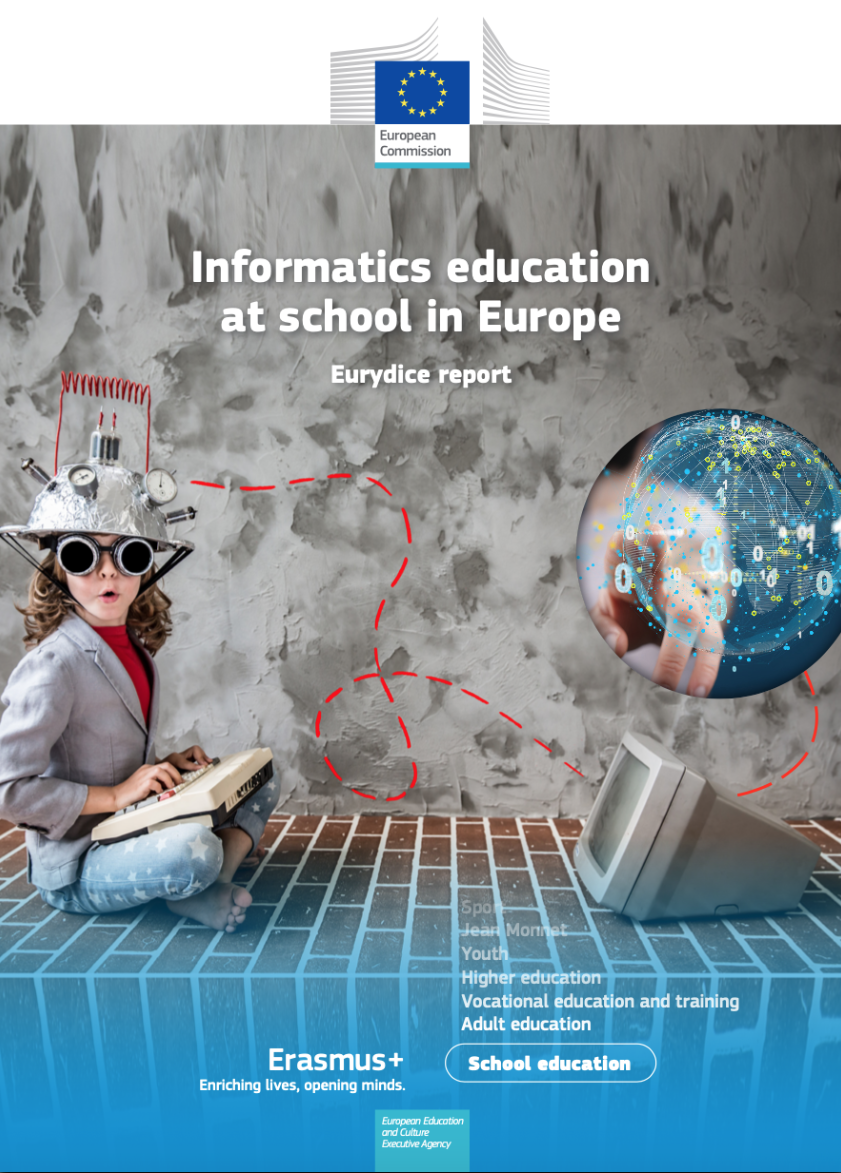
Informatics Europe President Prof. Enrico Nardelli has contributed as Scientific Expert to the report, which examines the subjects throughout primary and secondary education, including learning outcomes related to informatics in 37 European countries (39 education systems). The report also looks at the qualifications of the teachers of these subjects, training programmes and other support measures available to them.

Informatics Europe President Prof. Enrico Nardelli has contributed as Scientific Expert to the report, which examines the subjects throughout primary and secondary education, including learning outcomes related to informatics in 37 European countries (39 education systems). The report also looks at the qualifications of the teachers of these subjects, training programmes and other support measures available to them.
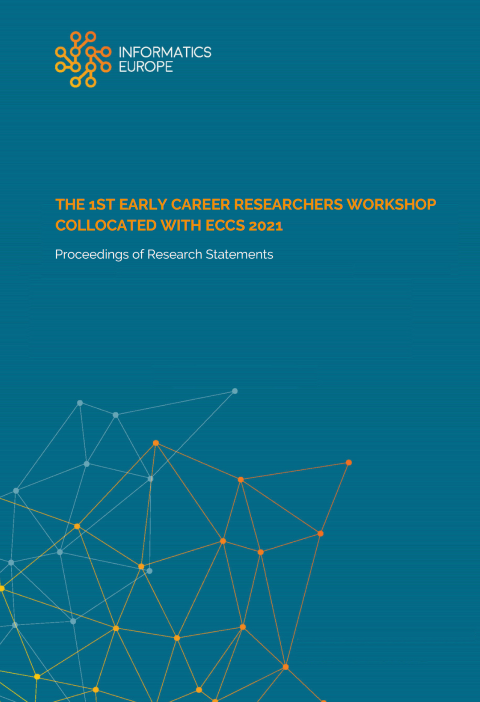
The research statements in this proceedings were submitted by the participants at the first Early Career Researchers Workshop collocated with the European Computer Science Summit (ECSS) 2021. They contain a wide variety of work, either completed or in progress, being undertaken by the current generation of PhD students and early career researchers in informatics.

The research statements in this proceedings were submitted by the participants at the first Early Career Researchers Workshop collocated with the European Computer Science Summit (ECSS) 2021. They contain a wide variety of work, either completed or in progress, being undertaken by the current generation of PhD students and early career researchers in informatics.
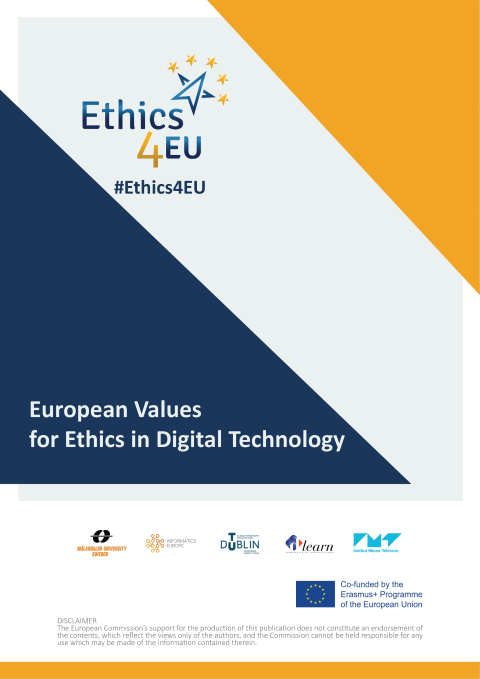
The research report on European Values for Ethics in Technology is the first Intellectual Output of the Ethics4EU project. Digital Ethics deals with the impact of digital Information and Communication Technologies (ICT) on our societies and the environment at large. It covers a wide spectrum of societal impacts including issues such as data governance, privacy and personal data, Artificial Intelligence (AI), algorithmic decision-making and pervasive technologies.

The research report on European Values for Ethics in Technology is the first Intellectual Output of the Ethics4EU project. Digital Ethics deals with the impact of digital Information and Communication Technologies (ICT) on our societies and the environment at large. It covers a wide spectrum of societal impacts including issues such as data governance, privacy and personal data, Artificial Intelligence (AI), algorithmic decision-making and pervasive technologies.
The research report is presented in two parts:
- A literature review on pertinent Digital Ethics concerns and challenges for an increasingly interconnected ICT world. The list of key ethical concerns was created in consultation with the Good Technology Collective, a global council of ethics experts.
- The presentation of the results of focus groups conducted with three key groups of stakeholders – academics, industry specialists, and citizens – which captured their concerns with regards to Ethics and ICT.
The report contains a number of guidelines (extracted from both literature and sessions with stakeholders) that can be used by teachers and lecturers in Computer Science faculties to create and deliver Digital Ethics related content.
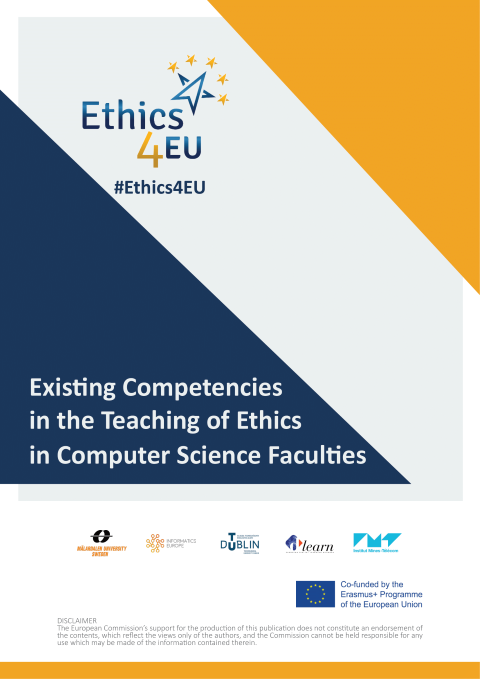
The research report presents the results of a survey conducted as part of the Ethics4EU project in 2020 on teaching practices for digital ethics across Europe. The report builds upon the previous work by Informatics Europe published in 2019 on requirements for the instruction of digital ethics at European Universities. The report summarises existing practices and outlines possible approaches for developing the future curricula of digital ethics in Computer Science programs.

The research report presents the results of a survey conducted as part of the Ethics4EU project in 2020 on teaching practices for digital ethics across Europe. The report builds upon the previous work by Informatics Europe published in 2019 on requirements for the instruction of digital ethics at European Universities. The report summarises existing practices and outlines possible approaches for developing the future curricula of digital ethics in Computer Science programs.
This report is one of the deliverables for the Ethics4EU project. It presents results obtained from a survey conducted in early 2020 that polled faculty from Computer Science and related disciplines on teaching practices in Computer Ethics in Computer Science across Europe. The survey was completed by respondents from 61 universities across 23 European countries. Participants were surveyed on whether or not Computer Ethics is taught to Computer Science students at each institution, the reasons why Computer Ethics is or is not taught, how Computer Ethics is taught (for example, as a standalone course or embedded within other courses), the background of staff who teach Computer Ethics and the scope of Computer Ethics curricula. Data was also gathered on teaching and learning methods used (theory, case studies, practical work) and how Computer Ethics is assessed. The results of the survey are a comprehensive insight into teaching practices for Computer Ethics in Computer Science and related disciplines and will inform the development of new curricula and learning resources for Digital Computer Ethics as part of the Ethics4EU project.

This report presents the results of the discussions held during the workshop Bridging the Digital Talent Gap: Towards Successful Industry-University Partnerships organized by Informatics Europe and the European Commission’s Directorate-General for Communications Networks, Content and Technology (DG CONNECT) in Rome on October 2019.

This report presents the results of the discussions held during the workshop Bridging the Digital Talent Gap: Towards Successful Industry-University Partnerships organized by Informatics Europe and the European Commission’s Directorate-General for Communications Networks, Content and Technology (DG CONNECT) in Rome on October 2019.
Currently, the EU is facing a systemic gap in terms of digital competences, including the most advanced. Almost all Member States face shortages for digital experts in all areas of ICT. If not urgently addressed this digital talent gap will consist in a serious threat for the future economic development of Europe.
To consider how to best address the situation, Informatics Europe and the European Commission’s Directorate-General for Communications Networks, Content and Technology (DG CONNECT) decided to co-organise the Digital Talent Gap Workshop on October 2019 in Rome, where participants brainstormed ways of boosting collaboration between academic institutions and Industry. The workshop brought together representatives of universities, businesses of all sizes, and students, and focus on Artificial Intelligence, Cyber Security and Software Engineering.
Participants were encouraged to share their insights and experiences, work together to explore the issues at stake, and co-design concrete solutions for the way forward. The results of this fertile discussion can be found in this report, which will feed into the current debate on future policies, including programmes at European level like the Digital Europe programme.
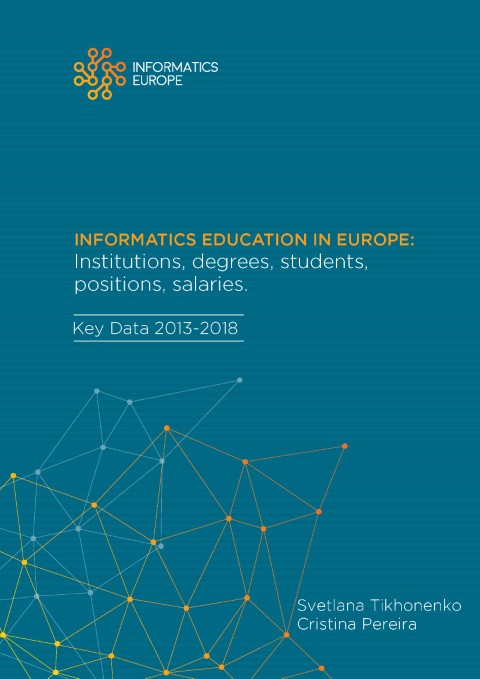
Seventh edition of the report series on Informatics higher education in Europe. Based on information from 22 represented countries, it offers a wealth of fundamental data covering the period 2013-2018: institutions awarding degrees in the field, student enrolments, degrees awarded, gender information, academic titles, up to precise and much-needed data about academic salaries across European countries. The series gives unique insights into the state of higher education in Informatics in Europe today.
A summary is openly accessible by following this link.
Logged in IE members can download the full report using the link below.

Seventh edition of the report series on Informatics higher education in Europe. Based on information from 22 represented countries, it offers a wealth of fundamental data covering the period 2013-2018: institutions awarding degrees in the field, student enrolments, degrees awarded, gender information, academic titles, up to precise and much-needed data about academic salaries across European countries. The series gives unique insights into the state of higher education in Informatics in Europe today.
A summary is openly accessible by following this link.
Logged in IE members can download the full report using the link below.
Parameters studied: institutions awarding degrees in the field, student enrolments, degrees awarded, gender information, academic titles, academic salaries.
Countries covered: Austria, Belgium, Bulgaria, Czech Republic, Denmark, Estonia, Finland, France, Germany, Greece, Ireland, Italy, Latvia, Lithuania, The Netherlands, Norway, Poland, Portugal, Romania, Spain, Switzerland, and UK.
Also includes data about Universities of Applied Sciences for countries where such institutions exist distinct from traditional Universities.
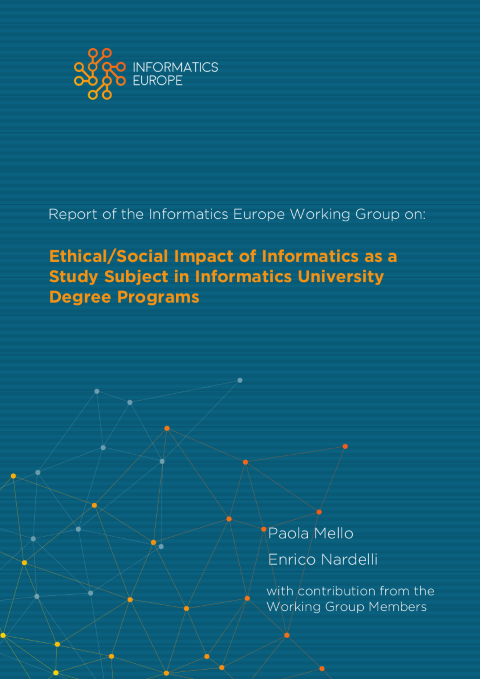
The report is the first product of the activity of the working group on Ethical/Social Impact of Informatics as a Study Subject in Informatics University Degree Programs. It outlines the possible approaches, the state of the art, and suggestions and guidelines for inclusion of topics related to ethics, responsibility and social impacts in Informatics university degree programs.
A summary is openly accessible by following this link.
Logged in IE members can download the full report using the link below.

The report is the first product of the activity of the working group on Ethical/Social Impact of Informatics as a Study Subject in Informatics University Degree Programs. It outlines the possible approaches, the state of the art, and suggestions and guidelines for inclusion of topics related to ethics, responsibility and social impacts in Informatics university degree programs.
A summary is openly accessible by following this link.
Logged in IE members can download the full report using the link below.
The report summarizes in data and figures the results of the online survey conducted among the working group members in spring 2019. 30 out of 32 members replied to the questionnaire providing their comments and feedback on the topic. This collected material is a first step towards a more deep and informed discussion about the topic of if and how ethical/social impact of Informatics should be a study subject in Informatics university degree programs.
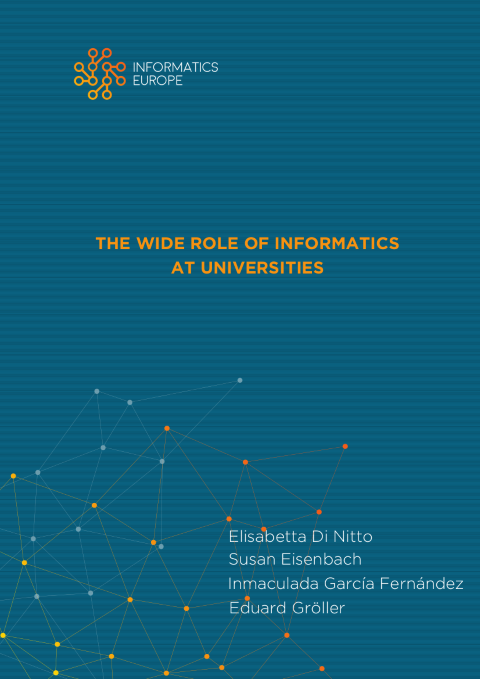
The report presents the results of the online survey conducted by Informatics Europe Working Group on the Wide Role of Informatics at Universities. The main goals were to understand the value universities place on interdisciplinary research and teaching, what happens in practice with hiring and supporting interdisciplinary academics, and what structures are in place to support interdisciplinary work. The Data Science’s impact was also examined in detail, given its rapid rise and importance. Forty eight universities from nineteen European countries have participated in the survey providing answers on these strategic topics.
A summary is openly accessible by following this link.
Logged in IE members can download the full report using the link below.

The report presents the results of the online survey conducted by Informatics Europe Working Group on the Wide Role of Informatics at Universities. The main goals were to understand the value universities place on interdisciplinary research and teaching, what happens in practice with hiring and supporting interdisciplinary academics, and what structures are in place to support interdisciplinary work. The Data Science’s impact was also examined in detail, given its rapid rise and importance. Forty eight universities from nineteen European countries have participated in the survey providing answers on these strategic topics.
A summary is openly accessible by following this link.
Logged in IE members can download the full report using the link below.
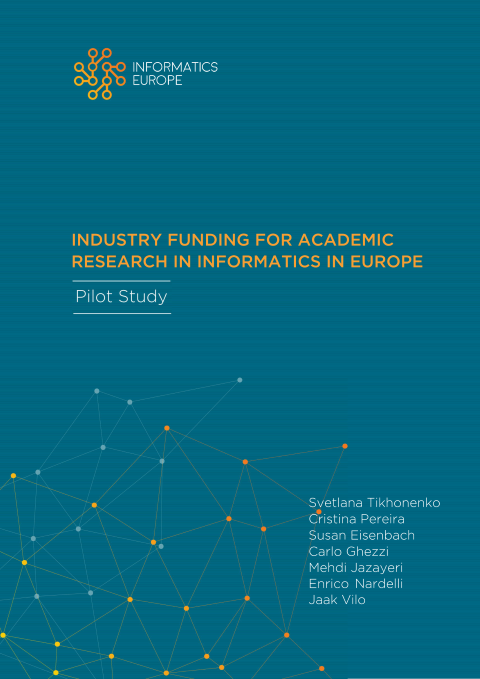
Report presents the results of a pilot study exploring the landscape of industry-funded Informatics research in academic institutions in Europe. The main goal is to understand the current level of industry funding going to different areas of Informatics research in Europe, similarities or differences in the way this money is invested in different countries. Nine academic institutions in nine different universities from four European countries – Germany, the Netherlands, Switzerland and UK – have participated in the study, providing data about research projects and areas receiving funding from industry in 2017.
A summary is openly accessible by following this link.
Logged in IE members can download the full report using the link below.

Report presents the results of a pilot study exploring the landscape of industry-funded Informatics research in academic institutions in Europe. The main goal is to understand the current level of industry funding going to different areas of Informatics research in Europe, similarities or differences in the way this money is invested in different countries. Nine academic institutions in nine different universities from four European countries – Germany, the Netherlands, Switzerland and UK – have participated in the study, providing data about research projects and areas receiving funding from industry in 2017.
A summary is openly accessible by following this link.
Logged in IE members can download the full report using the link below.
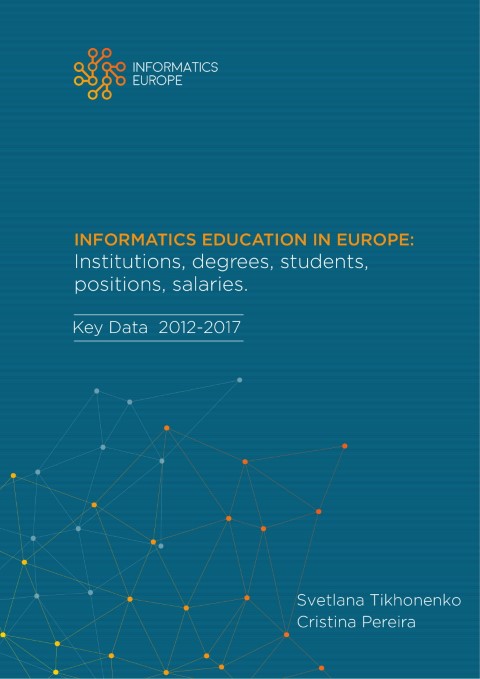
Sixth edition of the report series on Informatics higher education in Europe. Based on information from 19 represented countries, it offers a wealth of fundamental data covering the period 2012-2017: institutions awarding degrees in the field, student enrolments, degrees awarded, gender information, academic titles, up to precise and much-needed data about academic salaries across European countries. The series gives unique insights into the state of higher education in Informatics in Europe today.
A summary is openly accessible by following this link.
Logged in IE members can download the full report using the link below.

Sixth edition of the report series on Informatics higher education in Europe. Based on information from 19 represented countries, it offers a wealth of fundamental data covering the period 2012-2017: institutions awarding degrees in the field, student enrolments, degrees awarded, gender information, academic titles, up to precise and much-needed data about academic salaries across European countries. The series gives unique insights into the state of higher education in Informatics in Europe today.
A summary is openly accessible by following this link.
Logged in IE members can download the full report using the link below.
Parameters studied: institutions awarding degrees in the field, student enrolments, degrees awarded, gender information, academic titles, academic salaries.
Countries covered: Austria, Belgium, Bulgaria, Denmark, Estonia, Finland, France, Germany, Greece, Ireland, Italy, Latvia, Lithuania, The Netherlands, Poland, Romania, Spain, Switzerland, and UK.
Also includes data about Universities of Applied Sciences for countries where such institutions exist distinct from traditional Universities.
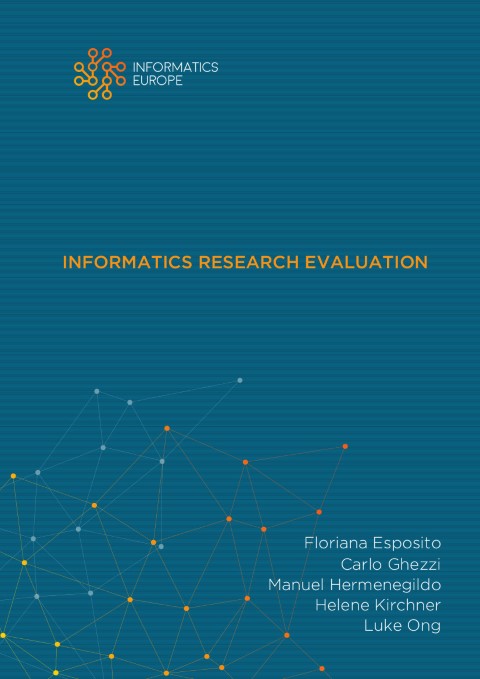
Report on Informatics Research Evaluation prepared by the Informatics Europe Research Evaluation Working Group. The report focuses mainly on the main principles and criteria that should be followed when individual researchers are evaluated for their research activity in the field of Informatics, addressing the specificities of this area. It confirms the findings of the 2008 report on Research Evaluation for Computer Science, while incorporating recent developments concerning the growing emphasis on collaborative, transparent, reproducible and accessible research.
A summary is openly accessible by following this link.
Logged in IE members can download the full report using the link below.

Report on Informatics Research Evaluation prepared by the Informatics Europe Research Evaluation Working Group. The report focuses mainly on the main principles and criteria that should be followed when individual researchers are evaluated for their research activity in the field of Informatics, addressing the specificities of this area. It confirms the findings of the 2008 report on Research Evaluation for Computer Science, while incorporating recent developments concerning the growing emphasis on collaborative, transparent, reproducible and accessible research.
A summary is openly accessible by following this link.
Logged in IE members can download the full report using the link below.
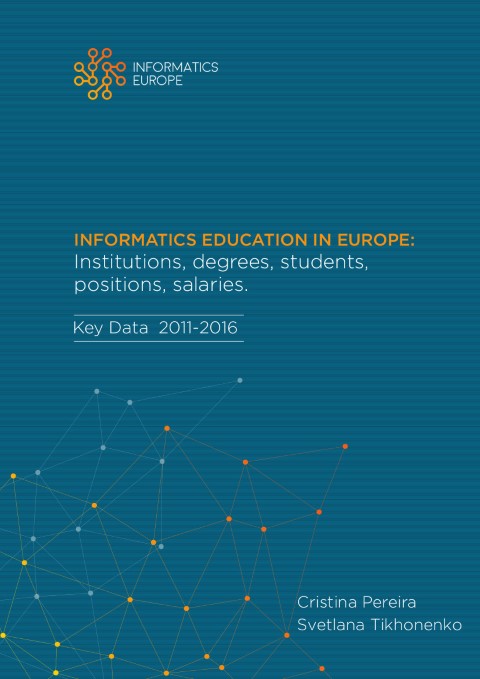
Fifth edition of the report series on Informatics higher education in Europe. Based on information from 16 represented countries, it offers a wealth of fundamental data covering the period 2011-2016: institutions awarding degrees in the field, student enrolments, degrees awarded, gender information, academic titles, up to precise and much-needed data about academic salaries across European countries. The series gives unique insights into the state of higher education in Informatics in Europe today.
A summary is openly accessible by following this link.
Logged in IE members can download the full report using the link below.

Fifth edition of the report series on Informatics higher education in Europe. Based on information from 16 represented countries, it offers a wealth of fundamental data covering the period 2011-2016: institutions awarding degrees in the field, student enrolments, degrees awarded, gender information, academic titles, up to precise and much-needed data about academic salaries across European countries. The series gives unique insights into the state of higher education in Informatics in Europe today.
A summary is openly accessible by following this link.
Logged in IE members can download the full report using the link below.
Parameters studied: institutions awarding degrees in the field, student enrolments, degrees awarded, gender information, academic titles, academic salaries.
Countries covered: Austria, Belgium, Denmark, Estonia, Finland, France, Germany, Greece, Ireland, Italy, Latvia, The Netherlands, Romania, Spain, Switzerland, and UK.
Also includes data about Universities of Applied Sciences for countries where such institutions exist distinct from traditional Universities.
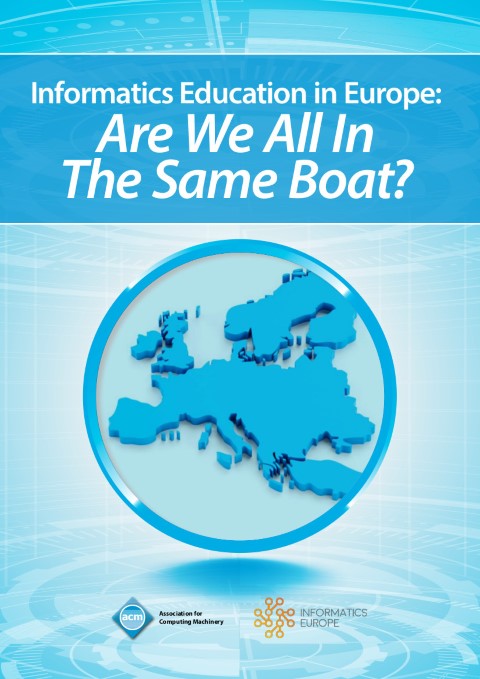
Based on a study of data collected in more than 35 European countries and their education autonomous regions, the report provides a rich source of information about the state of education in Informatics and Digital Literacy as well as the important matter of teacher training in these disciplines.The report describes the findings and recommendations of the Committee on European Computing Education (CECE), jointly established by ACM Europe and Informatics Europe and brings forward an unprecedented level of detail and information.

Based on a study of data collected in more than 35 European countries and their education autonomous regions, the report provides a rich source of information about the state of education in Informatics and Digital Literacy as well as the important matter of teacher training in these disciplines.The report describes the findings and recommendations of the Committee on European Computing Education (CECE), jointly established by ACM Europe and Informatics Europe and brings forward an unprecedented level of detail and information.

This volume is the result of the various presentations held during the 11th European Computer Science Summit, introduced by Hannes Werthner (TU Wien, Austria) and Frank van Harmelen (Vrije Universiteit Amsterdam, Netherlands). The prospects and evolution of informatics are the center of the book. Classical computer science is built on the notion of an “abstract” machine, which can be instantiated by software to any concrete problem-solving machine, changing its behavior in response to external and internal states, allowing for self-reflective and “intelligent” behavior. However, current phenomena such as the Web, cyber physical systems or the Internet of Things show us that we might already have gone beyond this idea. Thus computer scientists will need to reconsider the foundations of their discipline.

This volume is the result of the various presentations held during the 11th European Computer Science Summit, introduced by Hannes Werthner (TU Wien, Austria) and Frank van Harmelen (Vrije Universiteit Amsterdam, Netherlands). The prospects and evolution of informatics are the center of the book. Classical computer science is built on the notion of an “abstract” machine, which can be instantiated by software to any concrete problem-solving machine, changing its behavior in response to external and internal states, allowing for self-reflective and “intelligent” behavior. However, current phenomena such as the Web, cyber physical systems or the Internet of Things show us that we might already have gone beyond this idea. Thus computer scientists will need to reconsider the foundations of their discipline.
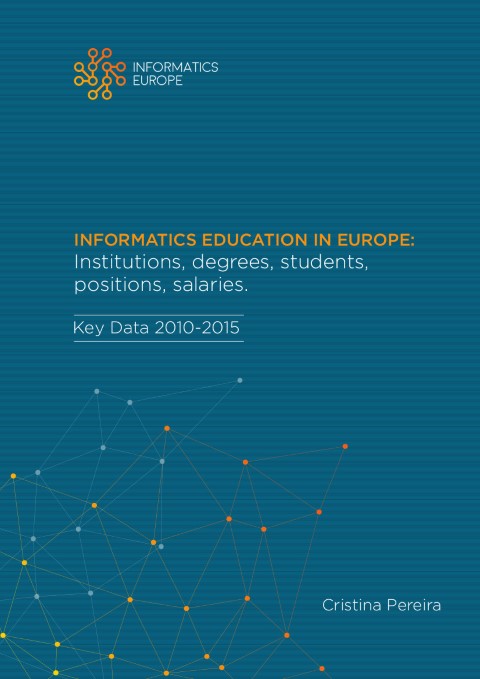
Fourth edition of the report series on Informatics higher education in Europe. Based on information from 15 represented countries, it offers a wealth of fundamental data covering the period 2010-2015: institutions awarding degrees in the field, student enrollments, degrees awarded, gender information, academic titles, up to precise and much-needed data about academic salaries across European countries. The series offers unique insights into the state of higher education in Informatics in Europe today.
A summary is openly accessible by following this link.
Logged in IE members can download the full report using the link below.

Fourth edition of the report series on Informatics higher education in Europe. Based on information from 15 represented countries, it offers a wealth of fundamental data covering the period 2010-2015: institutions awarding degrees in the field, student enrollments, degrees awarded, gender information, academic titles, up to precise and much-needed data about academic salaries across European countries. The series offers unique insights into the state of higher education in Informatics in Europe today.
A summary is openly accessible by following this link.
Logged in IE members can download the full report using the link below.
Countries covered: Austria, Belgium, Denmark, Estonia, France, Germany, Greece, Ireland, Italy, Latvia, The Netherlands, Romania, Spain, Switzerland, UK.
Also includes data about Universities of Applied Sciences for countries where such institutions exist distinct from traditional Universities.
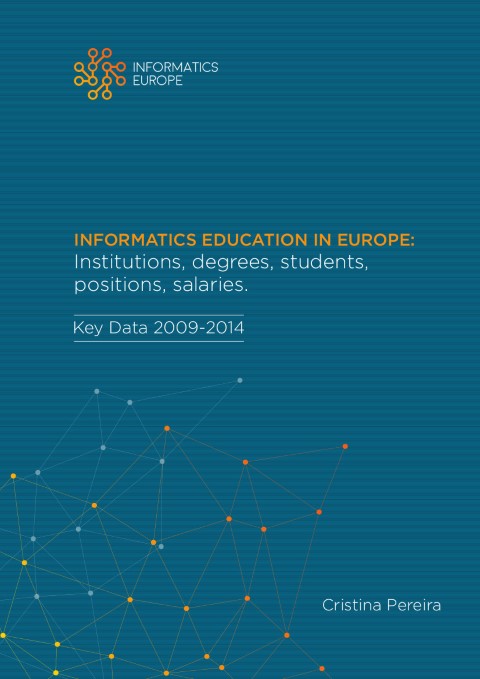
Third edition of the report series on Informatics higher education in Europe. Based on information from 13 represented countries, it offers a wealth of fundamental data covering the period 2009-2014: institutions awarding degrees in the field, student enrollments, degrees awarded, gender information, academic titles, up to precise and much-needed data about academic salaries across European countries. The series offers unique insights into the state of higher education in Informatics in Europe today.
A summary is openly accessible by following this link.
Logged in IE members can download the full report using the link below.

Third edition of the report series on Informatics higher education in Europe. Based on information from 13 represented countries, it offers a wealth of fundamental data covering the period 2009-2014: institutions awarding degrees in the field, student enrollments, degrees awarded, gender information, academic titles, up to precise and much-needed data about academic salaries across European countries. The series offers unique insights into the state of higher education in Informatics in Europe today.
A summary is openly accessible by following this link.
Logged in IE members can download the full report using the link below.
Parameters studied: institutions awarding degrees in the field, student enrollments, degrees awarded, gender information, academic titles, academic salaries
Countries covered: Austria, Denmark, Germany, Greece, Ireland, Italy, Latvia, Netherlands, Spain, Switzerland, UK, Turkey, and France for salaries.
Also includes data about Universities of Applied Sciences for countries where such institutions exist distinct from traditional Universities.
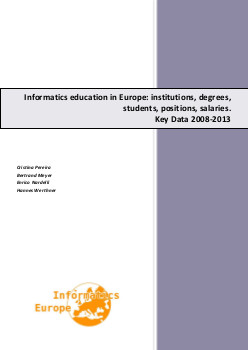
Second edition of the report series on Informatics higher education in Europe, covering 2008-2013. Presents data from nine countries on institutions awarding degrees in the field, student enrollments, degrees awarded, gender information, academic titles and precise and much-needed data about academic salaries across European countries. The series offers unique insights into the state of higher education in Informatics in Europe today.
A summary is openly accessible by following this link.
Logged in IE members can download the full report using the link below.

Second edition of the report series on Informatics higher education in Europe, covering 2008-2013. Presents data from nine countries on institutions awarding degrees in the field, student enrollments, degrees awarded, gender information, academic titles and precise and much-needed data about academic salaries across European countries. The series offers unique insights into the state of higher education in Informatics in Europe today.
A summary is openly accessible by following this link.
Logged in IE members can download the full report using the link below.
Parameters studied: institutions awarding degrees in the field, student enrollments, degrees awarded, gender information, academic titles, academic salaries
Countries covered: Austria, Denmark, Germany, Ireland, Italy, Netherlands, Switzerland, Turkey, UK and France for salaries.
Includes data from University of Applied Sciences for countries where such institutions exist distinct from traditional Universities.
A new section with a detailed description of the different education systems creates an even richer picture of the status of Informatics higher education in Europe.
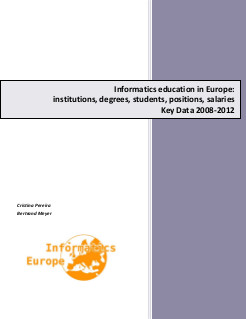
This report is the first comprehensive attempt to document the state of higher education in Informatics (computer science) in Europe. Based on information from seven represented countries, it offers a wealth of fundamental data, from institutions awarding degrees in the field, to student enrollments, degrees awarded, gender information, academic titles, as well as precise and much-needed data about academic salaries across European countries. The report covers the period 2008-2012.
A summary is openly accessible by following this link.
Logged in IE members can download the full report using the link below.

This report is the first comprehensive attempt to document the state of higher education in Informatics (computer science) in Europe. Based on information from seven represented countries, it offers a wealth of fundamental data, from institutions awarding degrees in the field, to student enrollments, degrees awarded, gender information, academic titles, as well as precise and much-needed data about academic salaries across European countries. The report covers the period 2008-2012.
A summary is openly accessible by following this link.
Logged in IE members can download the full report using the link below.
Parameters studied: institutions awarding degrees in the field, student enrollments, degrees awarded, gender information, academic titles, academic salaries
Countries covered: Denmark, Germany, Italy, Netherlands, Switzerland, UK and France for salaries.
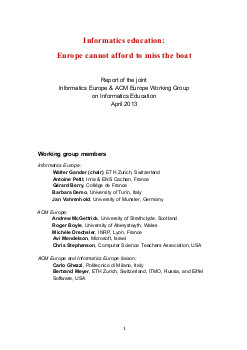
Report of the joint Informatics Europe and ACM Europe Working Group on Informatics education. This report identifies problems and suggest operational recommendations for policy and decision makers. It defines a blueprint for digital literacy and Informatics curricula adapted to the European context and explains why such curricula are critical to the economic health of European countries.

Report of the joint Informatics Europe and ACM Europe Working Group on Informatics education. This report identifies problems and suggest operational recommendations for policy and decision makers. It defines a blueprint for digital literacy and Informatics curricula adapted to the European context and explains why such curricula are critical to the economic health of European countries.
Section 1: recommendations on the teaching of digital literacy
Section 2: Informatics as an educational discipline and its educational value
Section 3: state of Informatics education in Europe
Section 4: principles for the teaching of Informatics
Section 5: training Informatics teachers
Section 6: recommendations
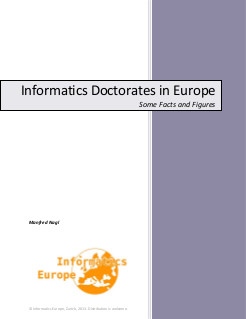
This report describes the findings and conclusions of an investigation, carried out for the ECSS 2012 in Barcelona, on the quality of Informatics doctorates in Europe.
A summary is openly accessible by following this link.
Logged in IE members can download the full report using the link below.

This report describes the findings and conclusions of an investigation, carried out for the ECSS 2012 in Barcelona, on the quality of Informatics doctorates in Europe.
A summary is openly accessible by following this link.
Logged in IE members can download the full report using the link below.
Section 1: Introduction and motivation
Section 2: Investigation method
Section 3: Characterization of the doctoral dissertation process
Section 4: Characterization of the results
Section 5: What is Informatics research?
Section 6: Academic conclusions: characterization, typical models, comparison
Section 7: Political conclusions
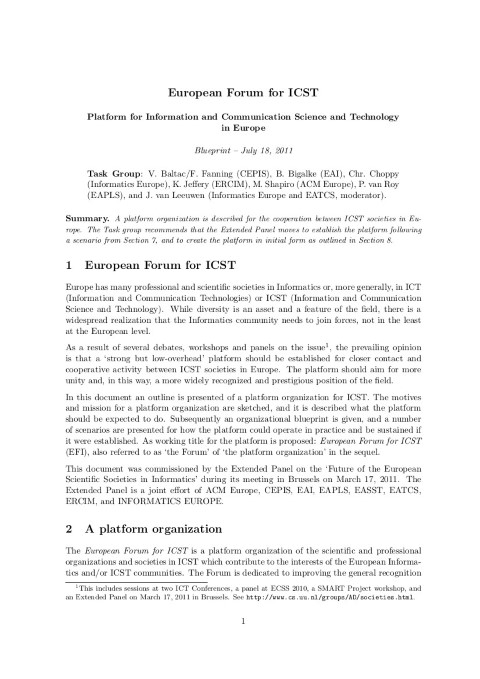
At the ECSS 2010 in Prague a panel with representatives from ACM Europe, CEPIS, EAI, ERCIM, EAPLS, EATCS and Informatics Europe convened to discuss the current situation and future prospects of the European scientific societies in Informatics. In March 2011 an extended panel reconvened to discuss the options for an actual format for the cooperative activity among ICST societies and for possible concrete steps towards the creation of a platform for collaboration. A task group was formed to study and develop a blueprint for an "open" platform organization for closer contact and cooperation among these societies in Europe.

At the ECSS 2010 in Prague a panel with representatives from ACM Europe, CEPIS, EAI, ERCIM, EAPLS, EATCS and Informatics Europe convened to discuss the current situation and future prospects of the European scientific societies in Informatics. In March 2011 an extended panel reconvened to discuss the options for an actual format for the cooperative activity among ICST societies and for possible concrete steps towards the creation of a platform for collaboration. A task group was formed to study and develop a blueprint for an "open" platform organization for closer contact and cooperation among these societies in Europe.
This document presents an outline of a platform organisation for ICST. The motives and mission for a platform organisation are sketched, and it is described what the platform should be expected to do. Subsequently an organisational blueprint is given, and a number of scenarios are presented for how the platform could operate in practice and be sustained if it were established.
This document was commissioned by the Extended Panel on the ‘Future of the European Scientific Societies in Informatics’ during its meeting in Brussels on March 17, 2011. The Extended Panel is a joint effort of ACM Europe, CEPIS, EAI, EAPLS, EASST, EATCS, ERCIM, and Informatics Europe.
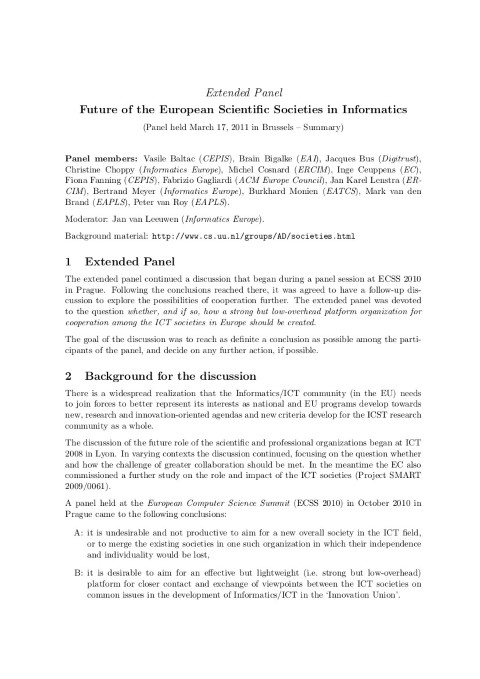
At the ECSS 2010 in Prague a panel with representatives from ACM Europe, CEPIS, EAI, ERCIM, EAPLS, EATCS and Informatics Europe convened to discuss the current situation and future prospects of the European scientific societies in Informatics. In March 2011 the panel reconvened in extended form to discuss the options for an actual format for the cooperative activity among ICST societies and for possible concrete steps towards the creation of a platform for collaboration. This report documents the panels conclusions.

At the ECSS 2010 in Prague a panel with representatives from ACM Europe, CEPIS, EAI, ERCIM, EAPLS, EATCS and Informatics Europe convened to discuss the current situation and future prospects of the European scientific societies in Informatics. In March 2011 the panel reconvened in extended form to discuss the options for an actual format for the cooperative activity among ICST societies and for possible concrete steps towards the creation of a platform for collaboration. This report documents the panels conclusions.
- Why is a platform needed, what are the goals, what role should it play, and what prestige will it have.
-
How can a platform like desired be realized, how can it be sustained, who is responsible for what, and what is needed in practice.
The panel was unanimous in its opinion on the need for a platform organisation to be created’ and identified several possible scenarios as to how this could be organised.
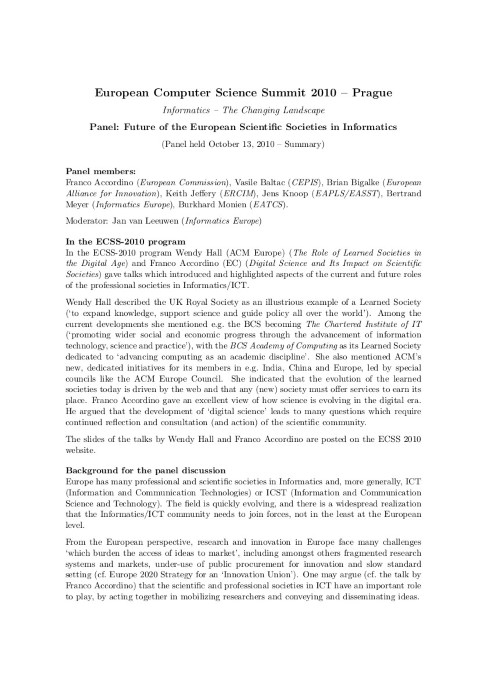
At the ECSS 2010 in Prague a panel with representatives from ACM Europe, CEPIS, EAI, ERCIM, EAPLS, EATCS and Informatics Europe convened to discuss the current situation and future prospects of the European scientific societies in Informatics. The panel decided to move from vision to action and extend the discussion on the actual form, mission and realization of a "strong but low overhead" platform for cooperative activity among the ICST societies.

At the ECSS 2010 in Prague a panel with representatives from ACM Europe, CEPIS, EAI, ERCIM, EAPLS, EATCS and Informatics Europe convened to discuss the current situation and future prospects of the European scientific societies in Informatics. The panel decided to move from vision to action and extend the discussion on the actual form, mission and realization of a "strong but low overhead" platform for cooperative activity among the ICST societies.
Europe has many professional and scientific societies in Informatics and, more generally, ICT (Information and Communication Technologies) or ICST (Information and Communication Science and Technology). The field is quickly evolving, and there is a widespread realisation that the Informatics/ICT community needs to join forces, not in the least at the European level.
From the European perspective, research and innovation in Europe face many challenges ‘which burden the access of ideas to market’, including amongst others fragmented research systems and markets, under-use of public procurement for innovation and slow standard setting (cf. Europe 2020 Strategy for an ‘Innovation Union’). One may argue that the scientific and professional societies in ICT have an important role to play, by acting together in mobilizing researchers and conveying and disseminating ideas.
As a step towards this goal, the European Computer Science Summit 2010 in Prague included a special panel to assess the current situation of the scientific societies, with their strengths and weaknesses, and to examine their possible future evolution in ‘the changing landscape'.
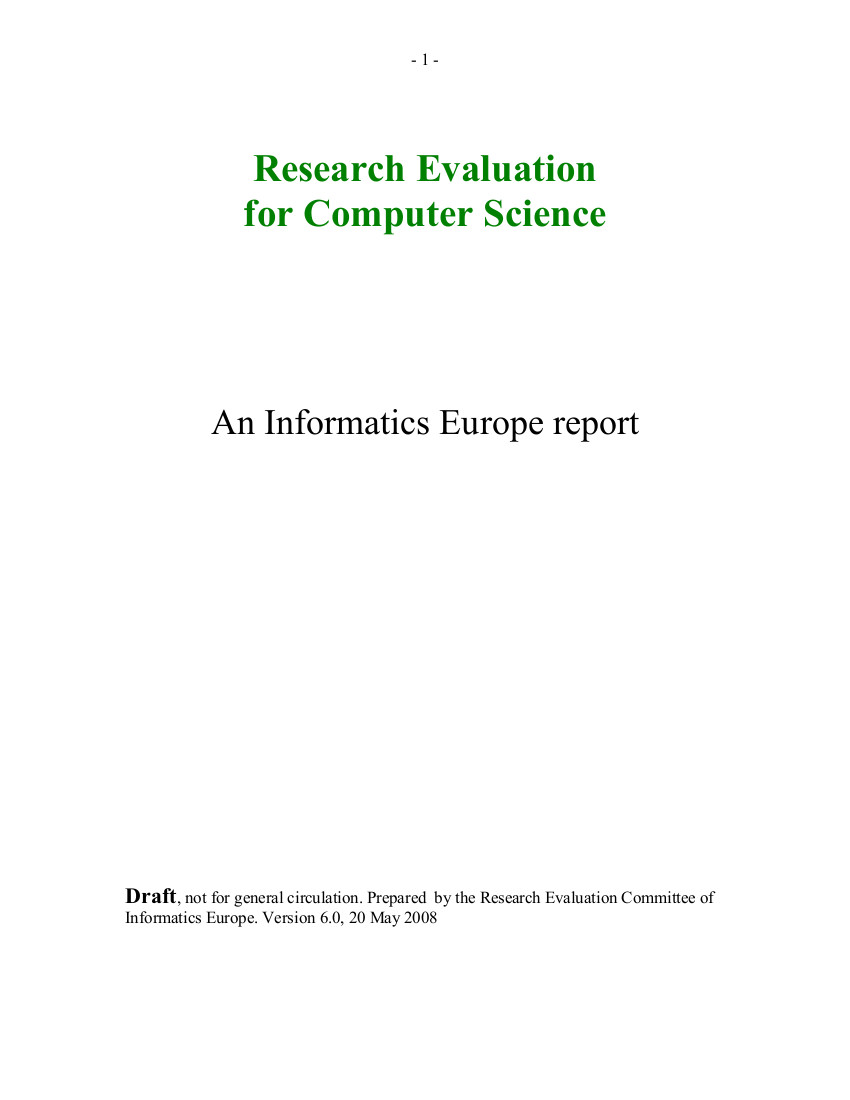
Report published in the Communications of the ACM in 2008 detailing the evaluation of research in computer science. The updated version of the report was published in 2018. Logged in IE members can download the full 2018 report through this link, while a summary is openly accessible by following this link.

Report published in the Communications of the ACM in 2008 detailing the evaluation of research in computer science. The updated version of the report was published in 2018. Logged in IE members can download the full 2018 report through this link, while a summary is openly accessible by following this link.
- Executive summary
- Research evaluation and its role
- Computer science and its varieties
- The computer science research culture
- Bibliometry
- The ISI case
- Assessment formulae
- Assessing the assessment
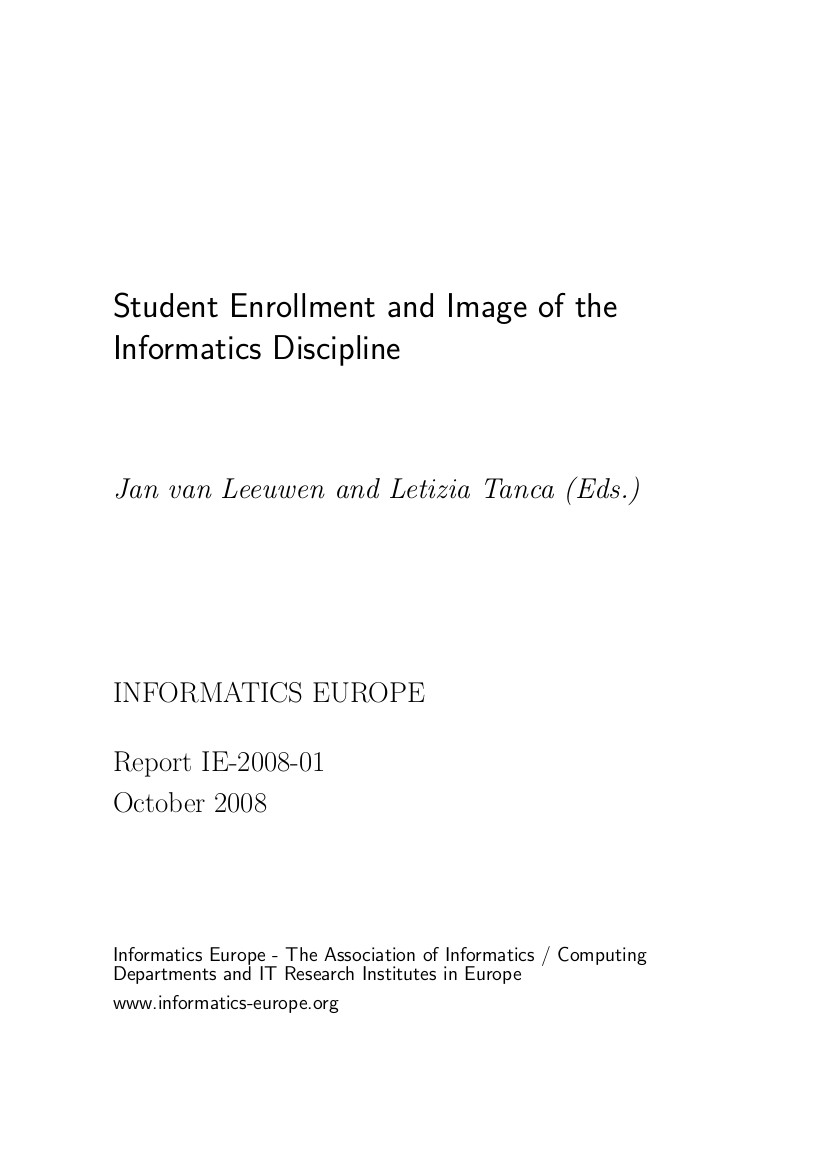
Report describing the results of the working group on "Student Enrollment and Image of the Discipline" created to collect insights on these issues and to come up with a document that advises the Informatics community on the state of the problem and on possible measures that could be taken to resolve it.

Report describing the results of the working group on "Student Enrollment and Image of the Discipline" created to collect insights on these issues and to come up with a document that advises the Informatics community on the state of the problem and on possible measures that could be taken to resolve it.
Why is student enrollment a problem in Informatics/Computing, at least in many of the (Western) European countries? Why is enrollment by female students lagging behind? What are the reasons of it, and what can be done about it? Are there best practices in certain countries from which we can all learn and benefit? Do potential students have the right image of Informatics as a field of study, as a science, as a profession? How should the field
be positioned?
The Working Group on ‘Student Enrollment and Image of the Discipline’ was created to collect insights on these issues and publish a document that advises the Informatics
Europe membership on the state of the problem and on possible measures that could be taken to resolve it. The present document is a preliminary report on the results of the working group.
1. Introduction
2. Analysis of the Problem
3. New Approaches to the Enrollment Problem
4. Perspectives and Challenges for Students
5. Informatics as Profession
6. Informatics as Science
7. Image of the Discipline
8. Ideas and Discoveries in Informatics
9. Conclusions
10.References
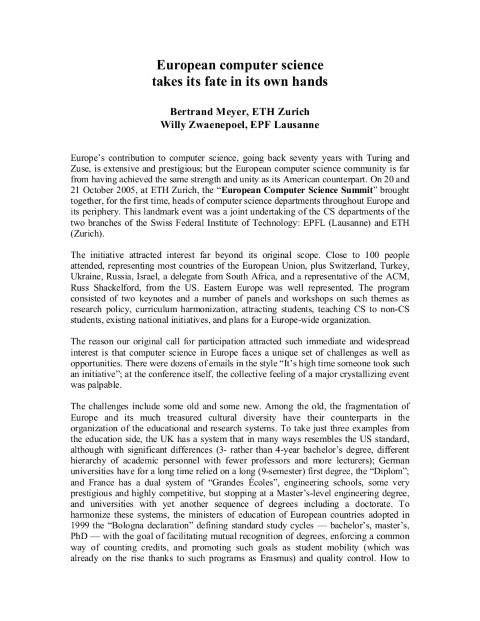
Report on the first ECSS and the background behind Informatics Europe published in the Communications of the ACM.

Report on the first ECSS and the background behind Informatics Europe published in the Communications of the ACM.
On 20 and 21 October 2005, at ETH Zurich, the “European Computer Science Summit” brought together, for the first time, heads of computer science departments throughout Europe and its periphery. The initiative attracted interest far beyond its original scope. Close to 100 people attended, representing most countries of the European Union, plus Switzerland, Turkey, Ukraine, Russia, Israel, a delegate from South Africa, and a representative of the ACM from the US. Eastern Europe was well represented. The program consisted of two keynotes and a number of panels and workshops on such themes as research policy, curriculum harmonization, attracting students, teaching CS to non-CS students, existing national initiatives, and plans for a Europe-wide organisation.
This document describes the unique set of of challenges as well as opportunities that computer science in Europe faces, as discussed at the first ECSS, as well as the background behind the creation of Informatics Europe.
